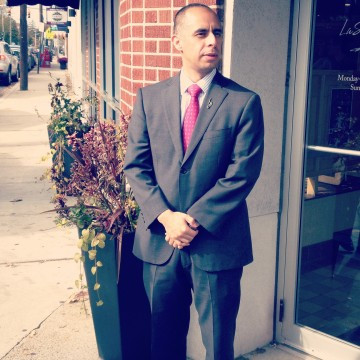Bishop: Water Water Everywhere Nor Any Drop in Rates
Thursday, May 11, 2017
When it comes to Providence’s finances, credit the Mayor with getting some of the issues right. It’s the solutions that founder.
Fire protection is too expensive. Firefighter contracts are clumsy, costly and correcting them overly constrained by state law.
And, when a city has 40% of its taxbase that cannot be taxed, according to state law, that is a problem.
The notion that Providence is always the problem and the state is always the adult in the room hardly holds water. But when it comes to debating with the state over something that does hold water, you would think that Jorge Elorza would be careful not to visit on other municipalities the fate of Providence, where its destiny is preordained elsewhere.
So when the Mayor’s team grappled with the inadequate recognition and compensation under state law and utilities regulation of Providence’s stranded capital in its reservoir and water system, you would think that right at the top of the list would be protecting the interests of the only town in the state with more untaxable property than Providence. 50% of the property in Scituate is tax free! Hadn’t heard of colleges or hospitals or arts centers located out that way? Forgotten is that the town only gets what it can negotiate with the Providence Water Board as payment in lieu of taxes for the half of the town covered by the Scituate Reservoir (well at least they retained the naming rights . . . ).
GET THE LATEST BREAKING NEWS HERE -- SIGN UP FOR GOLOCAL FREE DAILY EBLASTAs difficult as that circumstance is, Scituate could see the writing on the wall. If the water system were turned over to a state chartered regional agency, an even greater presumption that no taxes were due would attach to that decision. And payment in lieu would be subject to the same vagaries of those promises never kept to cities like Providence with high proportions of tax free property.
The Providence place mall comes to mind that only generates payment in lie of taxes of $250,000 on a tax liability of some $25 million dollars, or about 1% collection rate. So the city gave up 99% of its tax revenues. The state pitched in about a third of sales tax revenues on the mall. Guess who negotiated that deal. (To be fair the state also faces foregone revenue from reduction in sales at other businesses in the state, although the very point of the mall was not zero sum, but to land new stores not previously available in the state and to attract shoppers from Massachusetts, at which the effort has been modestly successful).
Failure to consider how Scituate would view a regionalized water authority was perhaps the least of where the Providence Administration went of the rails with its last minute plan to right the ship of city by saling the reservoir, but it brought by far the most people to object to the associated bill H-6122 at a statehouse hearing last week
The mayor rushed forward a half-baked plan that left opponents ready to pounce and may have given a bad name to a good idea. Indeed, it was not just the Republicans, but many suburban and exurban Democrats, who were sharpening their knives for what they conceived as yet another state bailout of Providence. The Mayor now has his work cut out for him to demonstrate why this is not a bailout and how the costs associated might be fairly distributed.
This could be done by reconstituting a more robust Water Resources Board independent of cautious environmental and planning structures – which have their own responsibilities and authority over major resource allocation decisions in any event. Contemporaneously, administration of the troubled Providence pension fund should be removed to a state trustee; and any major associated contribution from an anticipated city leverage of its reservoir must be balanced by union contributions since both the city and the workers are ultimate responsible for making up the shortfall.
The city has asked for someone to ‘negotiate with’. Ironically, the entity they proposed included no representative from Scituate. The drafters of the legislation suggested it would be a conflict of interest since this state authority would have to negotiate a payment to Scituate and there are no users of reservoir water in Scituate. But the same entity was to have 3 members representing Providence and was intended to negotiate an inordinately larger payment with Providence!
One of the most important facets of any potential workout might be differential rates. Nowhere has the Mayor’s administration acknowledged that the legal convenience of theoretical ownership is not a policy basis for the sunk cost of the reservoir to be recovered entirely by Providence. The burden of this ‘refinancing’. should not necessarily be shared equally by all who pay for water from the Scituate Reservoir.
This is not a concept lightly offered, as my family faces the burden of Providence water rates paid on several properties. But they also face the burden of Providence’s precarious fiscal position which threatens to undercut the viability of investments in the city. And unlike taxes, increased water rates in Providence that might result from moving capital from the water system to the city’s pension balance sheet would be paid by hospitals and universities that are currently insulated from contributing to the pension deficit.
To be fair to those institutions, simply paying more to Providence for it to continue with structural deficits and unsustainable spending can’t possibly seem rational, even if they were predisposed to contribute more. While a regional water authority might have independently valid purposes, it is contemplated now as a rescue for Providence. The same concerns should thus be front and center for state policy makers. Handing Providence a putative $300 million dollars without the union concessions and end to parochial management of the city pension fund, needed to do more than put a finger in the dike, is silly. It would be thowing good money after bad, and Detroit and Puerto Rico are more appropriate models. If this is Providence’s one play, it better be a hell of a good performance.
Brian Bishop is on the board of OSTPA and has spent 20 years of activism protecting property rights, fighting overregulation and perverse incentives in tax policy.
Related Slideshow: Winners and Losers in Raimondo’s FY18 Budget Proposal
Related Articles
- Bishop: Structural Changes to Address Structural Deficit
- Gencarella & Bishop: Billion Dollar ‘Big Dig’ - Fewer Bridges, Fewer Cars, Nearly Double The Cost
- Bishop: Welcome Joe Biden, to Roads That Don’t Work
- Bishop: Tax [Breaks] and Spending
- Bishop: Life in the Slowlane
- Bishop: 6/10 Connector - The $800 Million Mile
- Bishop: Post-Toll Impasse Between Public and Political Will
- Bishop: For Whom the Bill Tolls
- Bishop: Calm Yorke More Outrageous Than Brash Trump
- Bishop: 38 Stabilizations - Neverending Prov Tax Giveways are 38 Studios Redux
- Bishop: The Soft Under Belly of Rhodeworks - A Connector to Nowhere
- Bishop: It Takes [The] Village [People]
- Bishop: Revolutionary Providence Primaries
- Bishop: Corporatism for me But Not for Thee - Competing Proposals for 195 land?
- Bishop: Localism vs. Infrastructure
- Bishop: Government as a Business? After all, the Free Stuff From Government Isn’t a Loss Leader!
- Bishop: Immigration, is it Really black and White?
- Bishop: Met Café to Knickerbocker Café - Prov’s Retro Scene Isn’t in Prov Anymore, & That’s Politics
- Bishop: Our Love Hate Relationship With Amtrak
- Bishop: Not Much Difference Between Mainstream Media & Fake News
- Gencarella & Bishop: Political Football v Public Safety
- Bishop: Trump for President
- Bishop: Sleepy South County or Races That Matter?
- Bishop: Have an Alt-Thanksgiving
- Bishop: Water Water Everywhere Nor Any Drop in Rates























